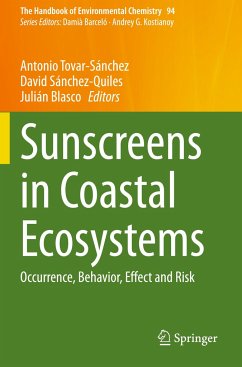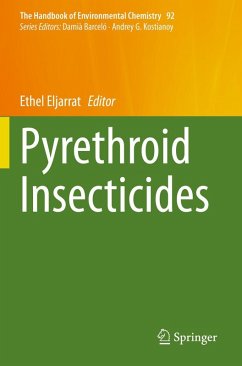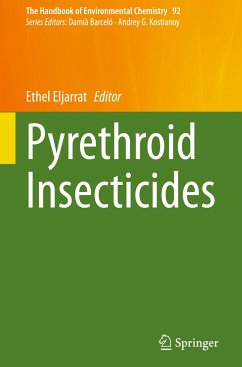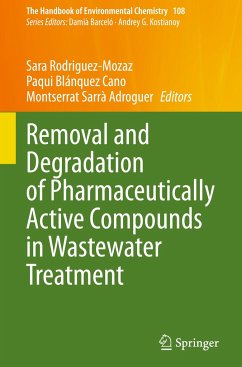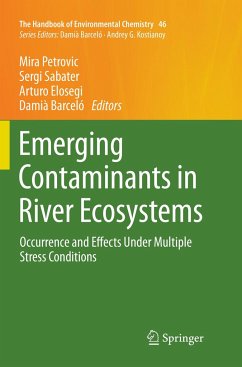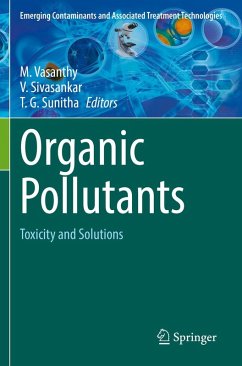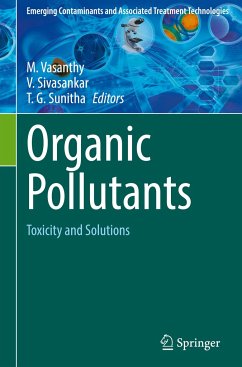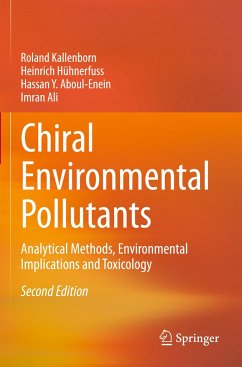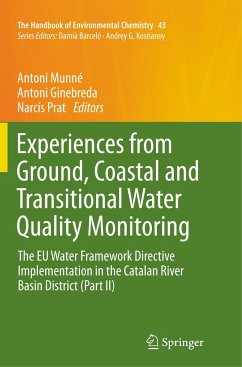
Sunscreens in Coastal Ecosystems
Occurrence, Behavior, Effect and Risk
Herausgegeben: Tovar-Sánchez, Antonio; Sánchez-Quiles, David; Blasco, Julián

PAYBACK Punkte
144 °P sammeln!
This book provides a comprehensive and authoritative review of the chemical analysis of UV filters in coastal waters and their impact on the marine environment. The sun care is today the most important sector within the cosmetics industry, with annual increases in sales. The main components of sunscreens, organic and inorganic UV filters, have been detected in many coastal regions, with the highest concentrations in coastal areas under high anthropogenic pressure. Moreover, these compounds have been found to be bioaccumulated in aquatic biota causing biological and toxicological responses; som...
This book provides a comprehensive and authoritative review of the chemical analysis of UV filters in coastal waters and their impact on the marine environment. The sun care is today the most important sector within the cosmetics industry, with annual increases in sales. The main components of sunscreens, organic and inorganic UV filters, have been detected in many coastal regions, with the highest concentrations in coastal areas under high anthropogenic pressure. Moreover, these compounds have been found to be bioaccumulated in aquatic biota causing biological and toxicological responses; some organic UV filters act as endocrine disruptors in aquatic biota, affecting survival, behavior, growth, development and reproduction. On the other hand, inorganic UV filters, mainly based on nanoparticles, have been demonstrated to have various impacts on marine organisms, such as inducing oxidative stress in abalones, accumulating in microalgae, affecting the immune response in mussels, bleaching corals, and genotoxicity in fish, among others. All these effects of sunscreens on the marine environment highlight the need for more stringent and environmentally friendly regulations.
This book covers the latest analytical methodologies used in assessing the impact of UV filters impact on marine waters, especially on marine biota, and also critiques the global regulation of UV filters and the environmental risk of using sunscreens. Featuring specific case studies of the environmental effects of sunscreens in the Mediterranean Sea and Hawaii, which highlight the importance of balancing human health with environmental health of coastal ecosystems, it will appeal not only to scientists and students from various disciplines (environmental chemistry, biology, ecology, biogeochemistry, fisheries and climate change among others), but also to environmental managers wanting to promote new restrictive regulations on the use of UV filters, and to professionals from the cosmetic industry interested in the development of eco-friendly sunscreens.
This book covers the latest analytical methodologies used in assessing the impact of UV filters impact on marine waters, especially on marine biota, and also critiques the global regulation of UV filters and the environmental risk of using sunscreens. Featuring specific case studies of the environmental effects of sunscreens in the Mediterranean Sea and Hawaii, which highlight the importance of balancing human health with environmental health of coastal ecosystems, it will appeal not only to scientists and students from various disciplines (environmental chemistry, biology, ecology, biogeochemistry, fisheries and climate change among others), but also to environmental managers wanting to promote new restrictive regulations on the use of UV filters, and to professionals from the cosmetic industry interested in the development of eco-friendly sunscreens.





